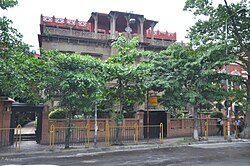Selected bibliography

- Downie, A. Bruce; Huq, Enamul; Vierstra, Richard; Hunt, Arthur G.; Chappell, Joseph; Zhu, Ling; Lloyd, Taylor D.; Dirk, Lynnette M. A.; Goodin, Michael (24 April 2018). "KELCH F-BOX protein positively influences Arabidopsis seed germination by targeting PHYTOCHROME-INTERACTING FACTOR1". Proceedings of the National Academy of Sciences. 115 (17): E4120–E4129. Bibcode:2018PNAS..115E4120M. doi: 10.1073/pnas.1711919115 . ISSN 1091-6490. PMC 5924874 . PMID 29632208.
- Majee, Manoj; Ghosh, Shraboni; Rao, Venkateswara; Verma, Pooja; Kaur, Harmeet; Kamble, Nitin Uttam; Petla, Bhanu Prakash; Saxena, Saurabh Chandra; Salvi, Prafull (11 October 2016). "Differentially expressed galactinol synthase(s) in chickpea are implicated in seed vigor and longevity by limiting the age induced ROS accumulation". Scientific Reports. 6 35088. Bibcode:2016NatSR...635088S. doi:10.1038/srep35088. ISSN 2045-2322. PMC 5057127 . PMID 27725707.
- Prakash, Bhanu; Kamble, Nitin; Majee, Manoj (21 September 2015). "Protein L-Isoaspartyl (D-aspartyl) Methyltransferases (PIMTs) are differentially regulated during seed development in Rice and provide seed vigor and longevity". Unpublished. doi:10.13140/rg.2.2.29218.89287.
{{cite journal}}: Cite journal requires|journal=(help) - Majee, Manoj; Saxena, Saurabh C.; Rao, Venkateswara; Petla, Bhanu Prakash; Kaur, Harmeet; Verma, Pooja (1 March 2013). "PROTEIN l-ISOASPARTYL METHYLTRANSFERASE2 Is Differentially Expressed in Chickpea and Enhances Seed Vigor and Longevity by Reducing Abnormal Isoaspartyl Accumulation Predominantly in Seed Nuclear Proteins". Plant Physiology. 161 (3): 1141–1157. doi:10.1104/pp.112.206243. ISSN 1532-2548. PMC 3585586 . PMID 23284083.
- Arora, Sandeep; Majee, Manoj; Dobriyal, Anoop K.; Jain, Sourabh; Saxena, Saurabh C.; Bhatt, Deepesh (1 February 2013). "Cloning, expression and functional validation of drought inducible ascorbate peroxidase (Ec-apx1) from Eleusine coracana". Molecular Biology Reports. 40 (2): 1155–1165. doi:10.1007/s11033-012-2157-z. ISSN 1573-4978. PMID 23065288. S2CID 17281561.